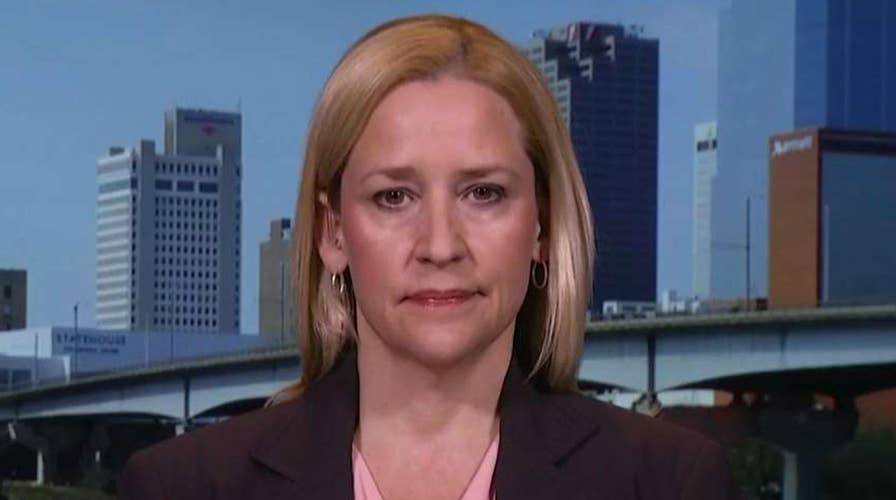Arkansas AG working to dismantle execution roadblocks
Leslie Rutledge speaks out on cases on 'America's Newsroom'
With only hours to go before the first of seven death row inmates were scheduled to be executed, the Arkansas Supreme Court halted the procedures, putting yet another legal roadblock in the state’s plan to conduct an unprecedented number of executions before the end of the month.
Monday’s move grants stays for Bruce Ward and Don Davis.
Lawyers for the men wanted the stays of execution while the U.S. Supreme Court takes up a case on access to independent mental health experts by defendants.
Later Monday, the 8th U.S. Circuit Court of Appeals overturned U.S. District Judge Kristine Baker's decision to halt the executions over the use of a controversial lethal injection drug, but the state Supreme Court's rulings remain in place.
Davis and Ward wanted stays of execution while the U.S. Supreme Court takes up a separate case concerning access to independent mental health experts by defendants. Oral arguments in that case are set for April 24 – putting a serious time constraint on Arkansas, which is trying to fast-track the lethal injections before one of the three key execution drugs expire on April 30.
There was a flurry of activity over the executions this past weekend.
A federal judge on Saturday temporarily blocked plans by the state to push through the executions, claiming that Arkansas’ rush to execute is reckless and unconstitutional. In response, state Attorney General Leslie Rutledge said all the issues being raised previously had been dealt with and claimed it was a stalling tactic.
“Appellees have had multiple opportunities to challenge their convictions, sentences, and – critically – their method of execution,” Rutledge said in a court brief. “Their guilt is beyond dispute.”
The inmates are all convicted murderers, including one found guilty of raping and murdering a mother of two and another convicted in the torture-killing of a 15-year-old boy.
The unprecedented pace of executions sought by the state stems from a practical dilemma – its supply of midazolam, one of three drugs used in its lethal injection procedure, is set to expire at the end of the month. Since 2013, at least four botched executions have been traced back to midazolam.
The executions had originally been expected to start on Monday. But even before the federal judge decision over the weekend, a state judge on Friday blocked the use of one of the drugs used in the three-drug lethal cocktail after a complaint from a drug distributor -- though the company said Saturday it was withdrawing its complaint due to the federal order.
ARKANSAS EXECUTIONS: WHO'S ON DEATH ROW
The ongoing court battles are part of a remarkable push; no state has tried to execute so many people in such a short period – or with so much controversy over how the punishment is carried out.
Robert Dunham, president of the Death Penalty Information Center, told Reuters that midazolam is an "inappropriate drug under any circumstance and carries an inherent risk of something going wrong."
Arizona, Kentucky and Florida have abandoned the use of the drug.
Arkansas Gov. Asa Hutchinson, a Republican, is pushing back on criticism and says the state has waited long enough – in some cases, more than two decades, for justice.
During a press conference in February, Hutchinson defended his actions, saying it wasn’t his “choice” to schedule the executions so close together.
“I would love to have those extended over a period of multiple months and years, but that’s not the circumstances that I find myself in,” he said.
Initially, eight men were on the calendar to die in 11 days but a federal judge on Thursday ordered a stay for Bruce Ward following a recommendation from the Arkansas Parole Board that he be granted clemency. Ward was set to be put to death on Monday.
The death row inmates scheduled for execution are all men -- four are black, three are white and all were convicted of murder.
Arkansas has not had an execution in more than a decade. If the state gets its way, it could perform three pairs of dual executions, though critics warn this increases the chances of something going wrong.
Defense attorney Jeff Rosenzweig, who represents three of the men the state is looking to execute, argues Arkansas’ rush to complete the executions is unconstitutional and "reeks of an assembly line."
“The kindest word I can say is that it’s unseemly,” he told Fox News during a phone interview.
The race for the state to beat the drug expiration deadline has set off protests from corrections officers, human rights groups and religious leaders, as well as last-minute legal challenges from the inmates and pharmaceutical makers.
Protesters started flooding the state capitol in Little Rock on Friday to urge Hutchinson to block the executions.
The Associated Press contributed to this report.













































